Unlock & Monetize The Expertise In You
We Help Entrepreneurs And Subject-Matter Experts Monetize The Full Spectrum Of Their Knowledge, Ideas, Skills, Gifts, and Talents
about sidhartha peddinti
Sidhartha "Sid" Peddinti is a philosopher, philanthropist, educator, and attorney known for integrating law, technology, and education to help entrepreneurs unlock and monetize their intellectual potential. Through diverse roles - researcher, writer, speaker, strategist, AI trainer, and investor - he demonstrates how individuals can transform lived experience and expertise into valuable intellectual property.
Sid teaches entrepreneurs how to identify and activate their hidden skillsets, repackaging them into scalable offerings such as courses, keynotes, books, or advisory services. His approach blends philosophy with practical frameworks, encouraging others to harness their full intellectual capacity and break free from the marketing and business noise that traps and suppresses imagination.
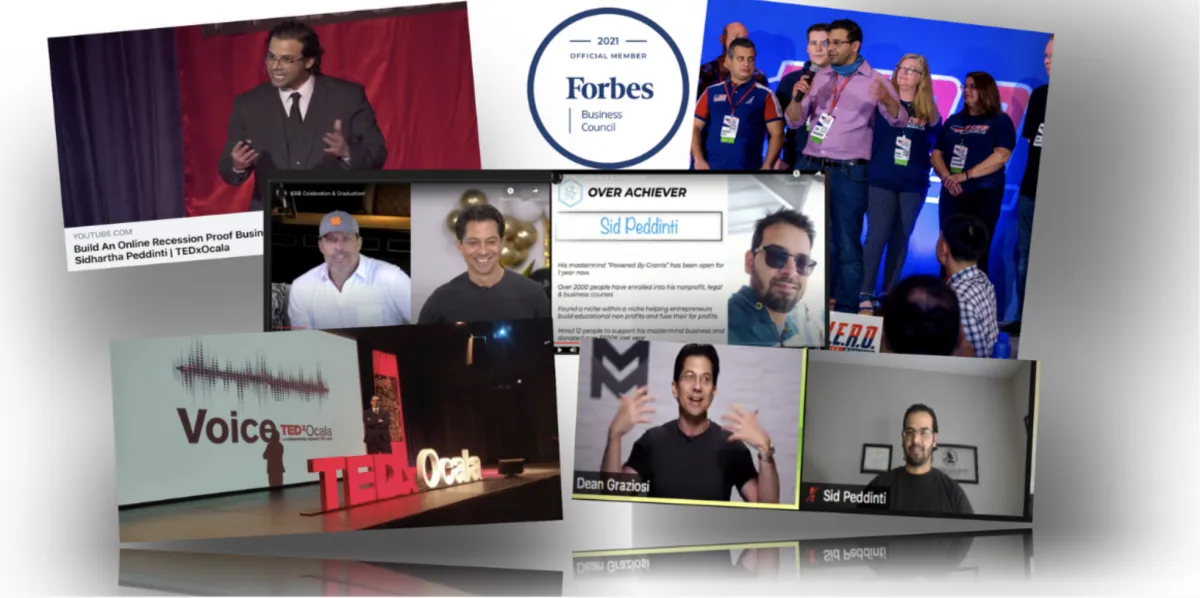
sid shares his business philosophies across various publications, stages, and platforms

We'd Love To Meet The Experts In You™
Jay-Z said it best: "I'm not a businessman. I am the business, man."
So, ask yourself - Are you running a business, or are you THE business?
Behind your professional title - lawyer, doctor, coach, consultant, tech founder - is a deeper vault of insights, ideas, philosophies, and, in our opinion, an entire universe of untapped intellectual personalities and identities who are capable of producing incredibly powerful intellectual property in various formats.
Your experiences, mistakes, breakthroughs, and expertise are assets - waiting to be monetized through books, keynotes, courses, consulting, articles, podcasts, and even software applications.
Yet most entrepreneurs get trapped in noise - “double your leads,” “niche down,” “go viral.” These distractions hide and suppress your true potential.
The truth? You’re not one brand, one company, or one title -
You’re a mosaic of intellectual identities and subject-matter experts.
The philosopher, the strategist, the content creator, the researcher, the media buyer, the innovator, the influencer, the speaker, the writer, the philanthropist, and the philosophical leader.
The real brains behind the "business" is not your marketing guru, sales company, or even your "million dollar coach" - it's YOU.
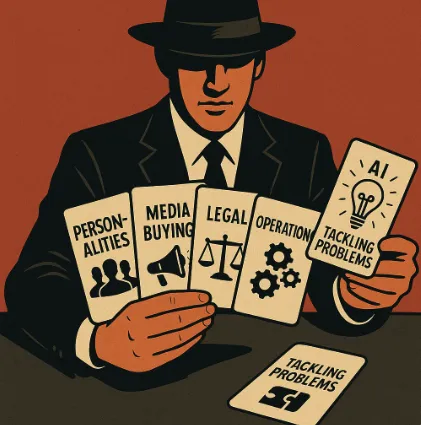
We'd Love To Meet The Experts In You™
Think of it like a deck of card, and each card represents a skills, a talent, a million-dollar idea, a discovery, a story, an experience, a win, a loss, failures, setbacks, and even 'breakthroughs'.
The "experts" you have been searching for to help you reach your true potential and that "next level" across all domains - finance, happiness, freedom, recognition, peace of mind, legacy, growth, wealth, health, etc. - are already within you.
Our mission, focus, and quest that been to find different pathways, business philosophies, and systems that can help entrepreneurs and subject-matter experts unlock these "expertise" and monetize in various formats - independent of each other, or interlocked and in-sync with each other.
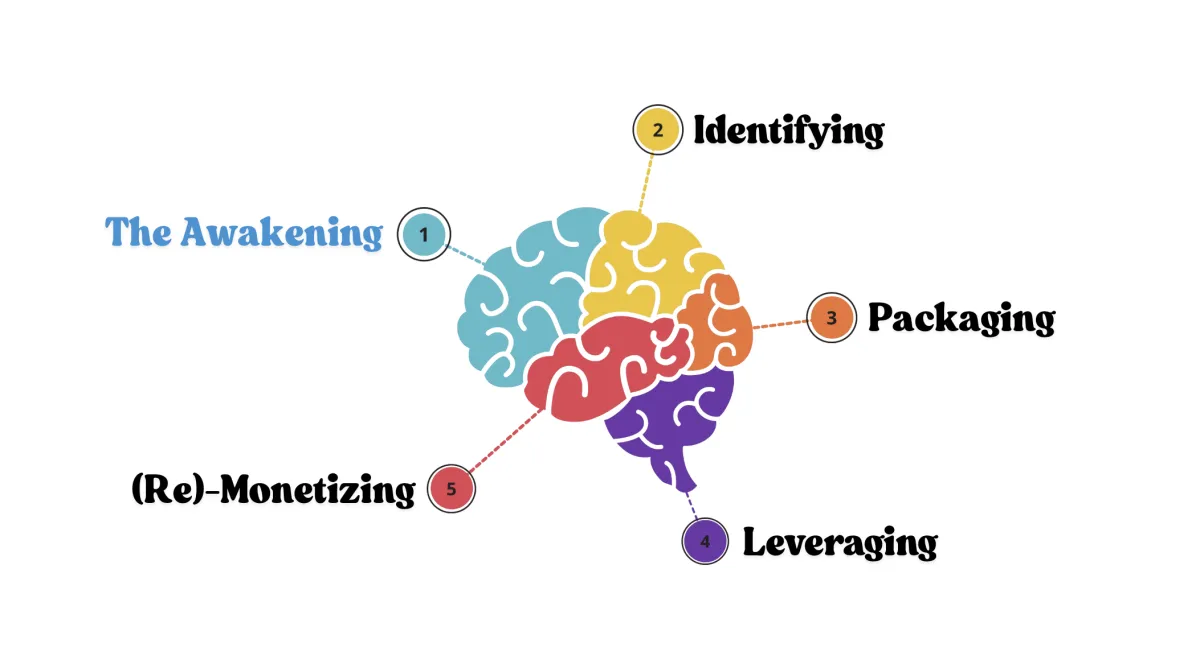
Here are the 5 stages of unlocking the Expertise In You™
Awaken The Experts In You
Identify Who Is Hunting For Them
Package The Expertise
Leverage The Opportunities
Monetizing Yourself - You Are The Business, All Of You, Each Expert Sitting In You, and All The Insights You Possess.
Take a short quiz to identify the hidden "Experts In You" and how you "package,
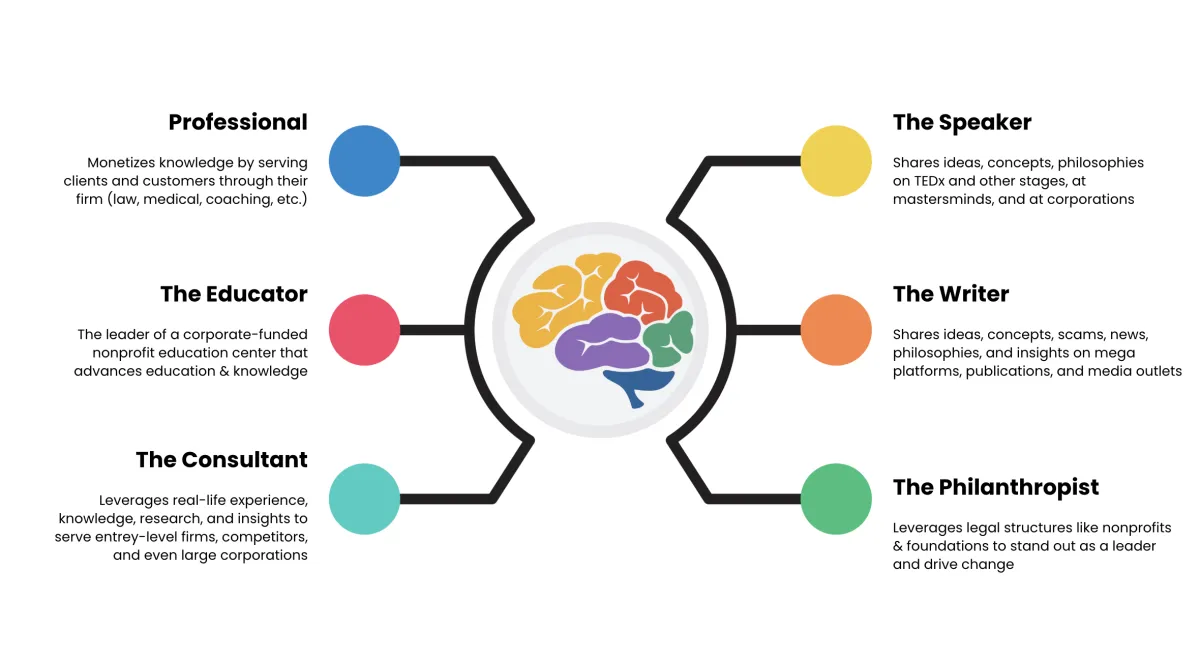
Go From Limited To Unlimited
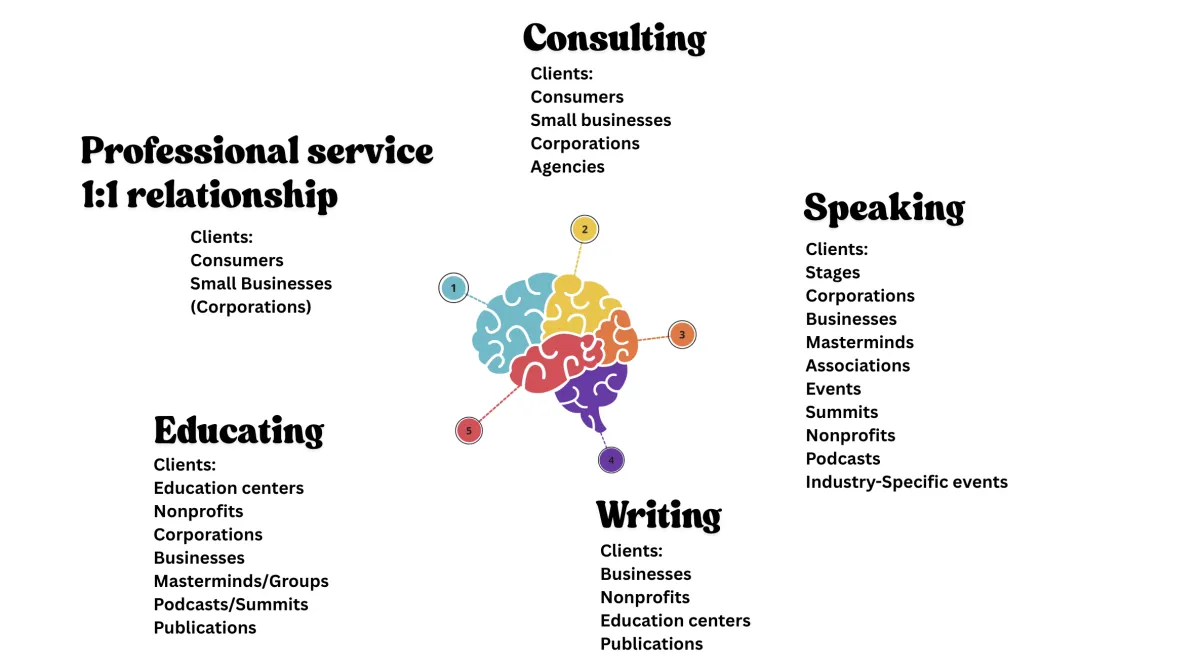
Let's look at the example of a law firm owner, who can repurpose and repackage their knowledge and insights into several different formats that can be monetized. Here are the various avenues to monetize his/her insights and knowledge:
Professional services: Offer premium legal services through a law firm (business law, contracts, estate planning, trademarks, etc.)
Marketing consulting: Provide branding, audience, marketing, technology, or AI consulting around building a law firm to new firms entering the market.
Writing: Publish your insights on platforms like Entrepreneur, Forbes, or Business Insider to build credibility and influence, while positioning yourself as a contributor.
Speaking: Speak at conferences, masterminds, fortune 500 corporations, and stages like TEDx, on legal, business, operations, or leadership topics.
Educational platform: Host courses, workshops, podcasts, or masterminds through a legal education nonprofit funded by grants and donations.
Impact investing: Use a private foundation to turn taxable income into impact capital - supporting causes you care about while reducing taxes.
Scale Your Name, Not Just You Ad Campaigns
To become the business and "own your digital name", you have to start advertising and showcasing your brilliance - the skills, knowledge, and insights you have gained, not just the services you offer to a handful of clients - for example: estate planning, FB marketing, or coaching work through your firm.
Every "gap" requires a different "hat", a hat which you already have in you - the vaious identities and personalities that you have developed over the years
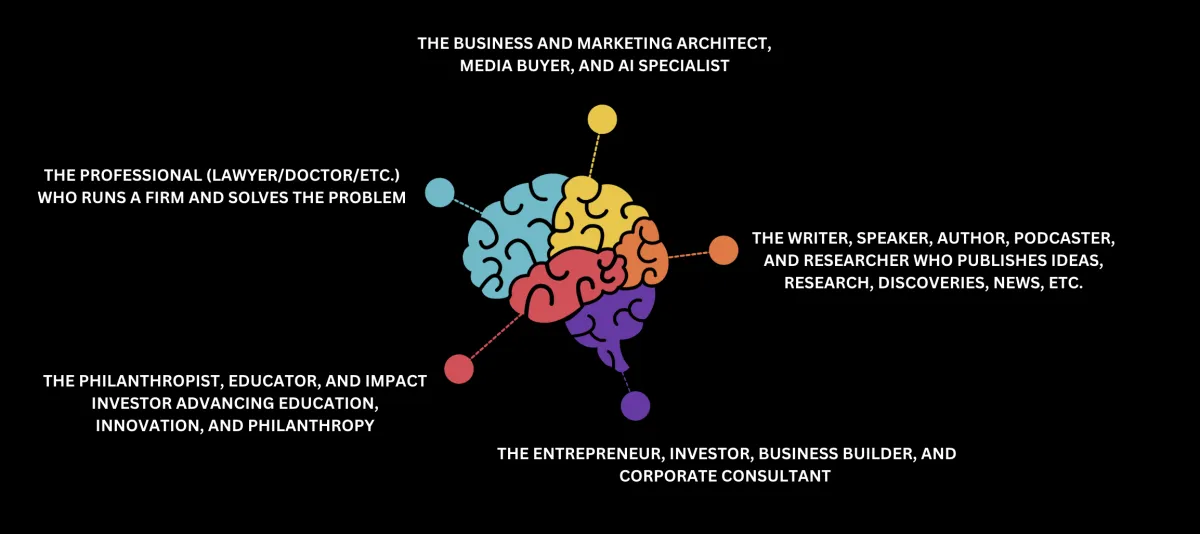
Most entrepreneurs and business owners are bombarded with advertising and marketing content that builds "fear" - the fear of missing out or called "FOMO". They are tempted to spend on the shiny new marketing strategy or tactic that is "doubling and tripling" other companies in their niche. They end up buying it, shelving it, and become hesitant in their decisions.
That's the rat race that traps business owners from monetizing their true potential and unlocking abundance and growth on all fronts - without major barriers.
What if there was a way to bypass and eliminate all the "noise" and directly publish, leverage, and monetize your knowledge and ideas without the "FOMO" - free from the rat race, not easily persuaded by the 7-figure business awards being handed out by marketers - completely free from the hype and immune to the noise?
That can happen when you stop operating a business, and decide to "BECOME THE BUSINESS". This involves awakening, identifying, packaging, and monetizing your existing skills and insights into various formats - the word "client" gets expanded to the entities that are in need of your IP, not just clients who hire you to work on their case or business matters.
Embrace the full spectrum of your inner genius - there's a lot more to you than meets the eye.
The educator
The trainer
the investor
the mentor
the marketer
the ai trainer
the influencer
the philanthropist
the growth strategist
the author
the keynote speaker
the freelance writer
the media buyer
the systems architect
the impact investor
Have You Leveraged These Opportunities?
$10,000
In (Free) Google Ads Every Month To Advertise Educational Content?
$2-3
Per Word For The Articles Or Blogs That You Write In Major Media Outlets
$15,000
Per Keynote Speech, On Average, Paid By Fortune 500 Corporations
30%
Taxable Income Reduction Every Year When You Donate To Your Foundation
Join Sid
I am obsessed with law, technology, and nonprofit-infused growth strategies and love sharing my experiences as an entrepreneur, investor, lawyer, and philanthropists and answering your questions.
Join me online and let's grow and thrive together.
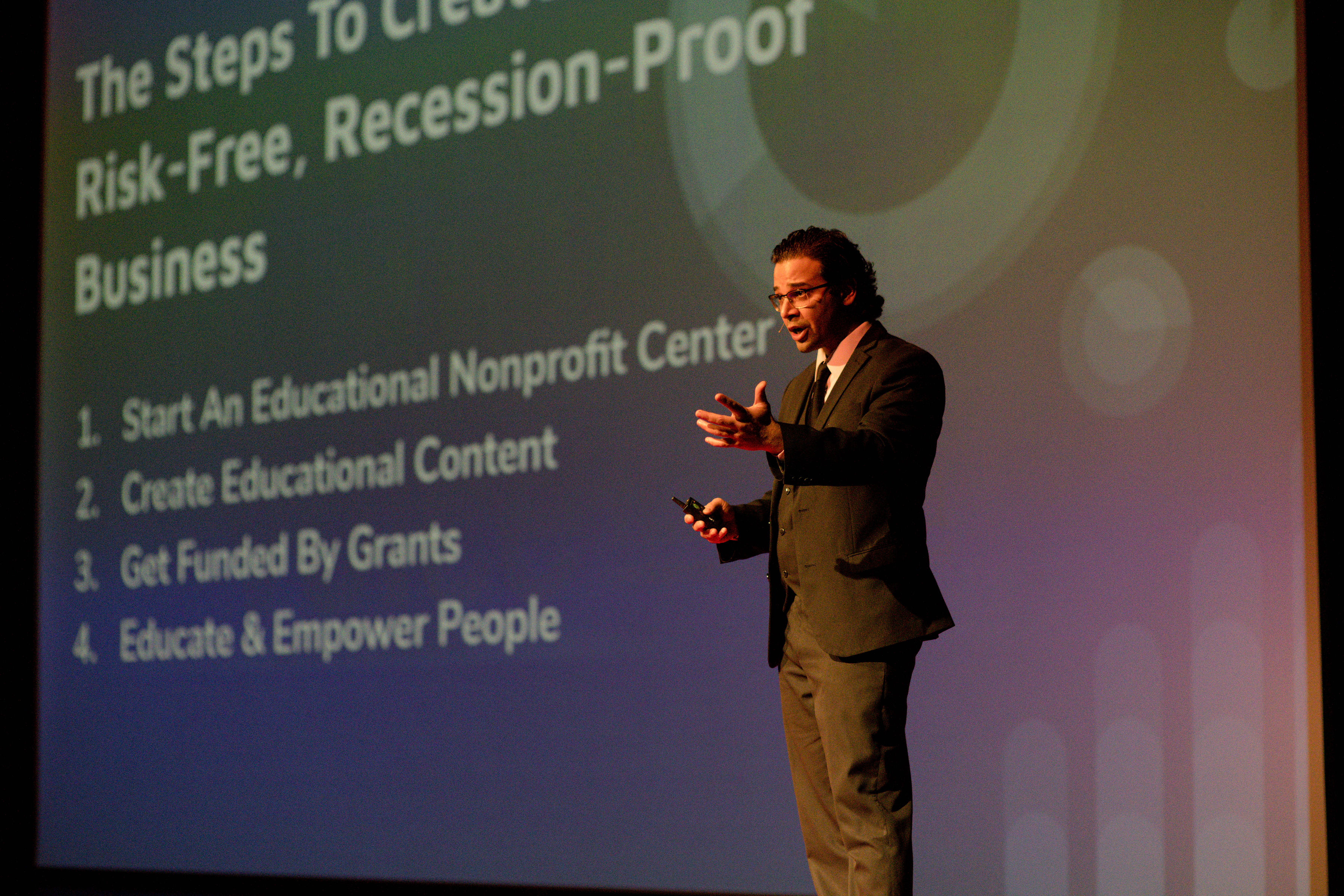
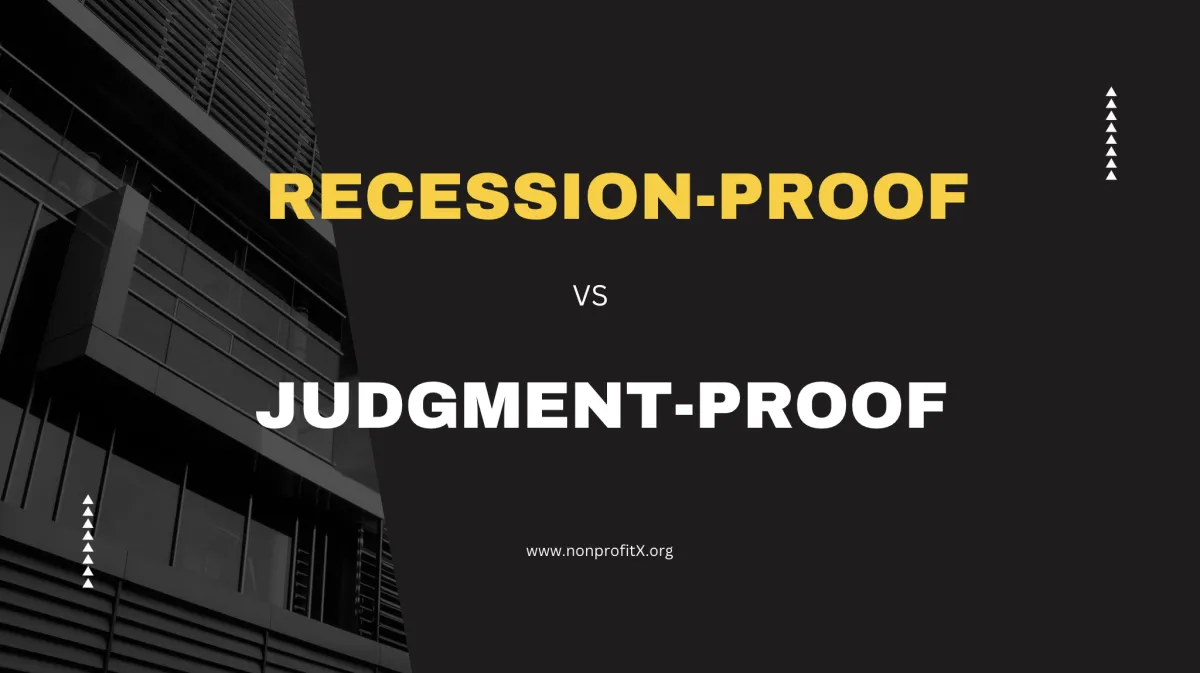
Stages of creating a risk-free business model
Stages of 'Proofing' Your Business: How to Recession-Proof, Bankruptcy-Proof, and Judgment-Proof Your Company
Introduction: Why Every Business Needs Protection
Stages of creating a risk-free business model
Introduction: Why Every Business Needs Protection
Stage 1: Recession-Proofing – Leveraging AI, Grants, and Alternative Funding
2. Securing Grants and Non-Debt Funding
3. Diversifying Revenue Streams
Stage 2: Bankruptcy-Proofing – Eliminating Personal Risk in Business Operations
1. The Power of the Nonprofit Model
2. Building a Hybrid Business Model
3. Eliminating Personal Guarantees & Business Debt
Stage 3: Judgment-Proofing – Protecting Yourself From Lawsuits and Collections
1. Separating Personal & Business Assets
2. Leveraging Anonymous Ownership Structures
In a world of economic uncertainty, business leaders must think beyond growth and profitability. The real question is: How resilient is your business? Can it withstand economic downturns, financial crises, and legal threats?
Traditional businesses are vulnerable to three major threats:
1. Recession risk – Economic downturns that shrink cash flow and kill demand.
2. Bankruptcy risk – A financial collapse that puts both business and personal assets in jeopardy.
3. Judgment risk – Lawsuits and liabilities that can drain financial resources.
This article explores how businesses can implement a three-stage proofing strategy to recession-proof, bankruptcy-proof, and judgment-proof their operations.
Stage 1: Recession-Proofing – Leveraging AI, Grants, and Alternative Funding
A recession-proof business can maintain operations and profitability despite economic downturns. This requires adaptive strategies, smart automation, and financial insulation.
1. Embracing AI and Automation
During recessions, businesses with high operational costs are the first to struggle. AI-driven automation helps reduce expenses while maintaining productivity.
- AI for customer service: Chatbots and AI-driven customer engagement reduce overhead.
- AI for finance & risk management: Predictive analytics help businesses identify and mitigate risks.
- AI for marketing: Automated campaigns optimize ad spending and improve ROI.
Example: A study by McKinsey found that AI adoption during downturns helps companies recover faster and outperform competitors post-recession ([Source](https://www.mckinsey.com)).
2. Securing Grants and Non-Debt Funding
Unlike loans, grants provide free capital with no repayment obligations. Businesses can tap into various funding sources:
- Government Grants – Federal and state agencies offer funding for innovation, sustainability, and workforce development.
- Nonprofit & Foundation Grants – Organizations fund industry-specific initiatives.
- Corporate Sponsorships – Large corporations partner with small businesses for community-driven projects.
Example: The U.S. Small Business Administration (SBA) provides grants for research, disaster relief, and innovation ([Source](https://www.sba.gov)).
3. Diversifying Revenue Streams
Businesses that rely on a single revenue source are at high risk during economic downturns. Diversification strategies include:
- Subscription models – Steady, recurring revenue mitigates sales volatility.
- B2B & B2C hybrid models – Expanding client bases cushions financial shocks.
- Government contracts – Long-term stability through public-sector partnerships.
Example: Netflix transitioned from DVD rentals to streaming subscriptions, securing a recession-resistant revenue model.
Stage 2: Bankruptcy-Proofing – Eliminating Personal Risk in Business Operations
Most business failures result in personal financial ruin because owners don’t properly separate their personal assets from business liabilities. A bankruptcy-proof business:
1. Limits personal liability
2. Accesses funding without personal risk
3. Structures ownership for legal protection
1. The Power of the Nonprofit Model
A nonprofit business structure prevents personal liability while allowing access to grants and donations.
- No Personal Guarantees – Unlike for-profits, nonprofits don’t require owners to sign personal guarantees for loans or liabilities.
- Tax-Exempt Status – Nonprofits qualify for IRS tax exemptions, minimizing financial burden.
- Access to Donor Funding – Unlike for-profits, nonprofits receive tax-deductible donations and foundation grants.
Example: Over $500 billion is donated annually to nonprofits in the U.S. ([Source](https://www.nptrust.org)).
2. Building a Hybrid Business Model
A hybrid model combines nonprofit benefits with for-profit income streams. Entrepreneurs can:
- Own a for-profit company while running a nonprofit for social impact.
- Leverage a nonprofit to receive grants while using a for-profit to sell services.
- Ensure legal separation to keep personal assets safe from business liabilities.
Example: Tesla operates as a for-profit company but receives billions in government grants and tax credits due to its sustainability initiatives.
3. Eliminating Personal Guarantees & Business Debt
Many business owners personally guarantee loans, leases, and vendor agreements, putting personal assets at risk. To mitigate this:
- Negotiate agreements without personal guarantees
- Use business credit, not personal credit
- Structure business ownership under a holding company
Example: Real estate investors use LLCs and trusts to keep personal assets separate from business operations, shielding themselves from debt.
Stage 3: Judgment-Proofing – Protecting Yourself From Lawsuits and Collections
Even profitable businesses can be wiped out by lawsuits. A judgment-proof business ensures that even if sued, creditors have nothing to collect.
1. Separating Personal & Business Assets
A properly structured business protects personal wealth from legal judgments.
- Using Trusts – A Domestic Asset Protection Trust (DAPT) shields personal assets from lawsuits.
- Holding Companies – Owning assets through an LLC or holding company protects individual businesses from liability.
- Insurance & Umbrella Policies – A comprehensive insurance plan covers liability risks.
Example: Billionaires like Elon Musk and Jeff Bezos keep their wealth in trusts and diversified holdings to limit personal exposure to lawsuits.
2. Leveraging Anonymous Ownership Structures
Some jurisdictions allow businesses to register under anonymous LLCs, preventing creditors from discovering assets.
- States like Wyoming and Nevada provide business anonymity, making it harder for lawsuits to trace assets.
- Offshore Business Entities – Incorporating offshore can provide additional legal layers of protection.
Example: Many global corporations use Delaware LLCs and offshore trusts to maintain privacy and legal protection.
3. Keeping Assets in Non-Seizable Vehicles
- Retirement accounts – Protected under ERISA laws from lawsuits.
- Life insurance & annuities – Often shielded from creditors in legal disputes.
- Nonprofit endowments – Funds held by nonprofits are generally not subject to personal lawsuits.
Example: O.J. Simpson was legally required to pay a $33 million civil judgment but avoided payment by keeping assets in protected pension funds.
---
Conclusion: The Ultimate Risk-Free Business Model
Most business owners focus on making money, but the smartest entrepreneurs focus on keeping it.
By implementing these three layers of protection, businesses can:
✅ Survive economic downturns (Recession-Proofing)
✅ Operate without personal financial risk (Bankruptcy-Proofing)
✅ Avoid financial devastation from lawsuits (Judgment-Proofing)
The best businesses combine these principles, leveraging AI, grants, alternative structures, and asset protection tools to scale safely and sustainably.
If you're serious about long-term success, it's time to 'proof' your business.

Innovation
Fresh, creative solutions.

Integrity
Honesty and transparency.

Excellence
Top-notch services.

FOLLOW US
COMPANY
CUSTOMER CARE
LEGAL
Copyright 2025. **Nonprofits&Foundations: 2025. All Rights Reserved.
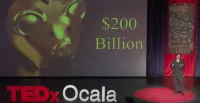
Facebook
Instagram
X
LinkedIn
Youtube
TikTok